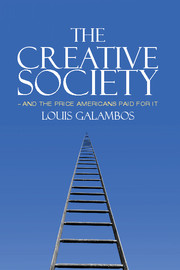‘Louis Galambos delivers a dazzling history of the modern United States as formed by its managers, scientists, diplomats, planners and lawyers. The hopeful message is that, more often than not, American expertise and innovation will save the day.'
Jay Hancock - economics columnist, The Baltimore Sun
‘The Creative Society is a bold, provocative, and compelling reinterpretation of perennial dilemmas in American society written by an historian at the top of his game. Louis Galambos brings his ‘organizational synthesis' to life by evoking the experiences that animated the new professionals – in education, business, government, foreign policy, and urban life – who have made America work since the 1890s. This is history at its best: thoughtful, captivating, witty, and wise. Everyone who reads The Creative Society will gain a new understanding of key crises in American history – and novel insights to make sense of the challenges we face today.'
Jeffrey L. Sturchio - Senior Partner, RabinMartin and former president and CEO, Global Health Council
‘Louis Galambos is equally adept as storyteller and historian. Witty, readable, illuminating, and sometimes highly personal, this is a history book with the drama of a novel. Professor Galambos charts twentieth-century American development in four broad areas – urbanization, innovation, economic security, and internationalism – and weaves throughout these concurrent narratives an astonishing array of detail. His cast of characters is America's self-proclaimed and educated professionals. Lawyers, economists, nurses, urban planners, mining engineers, teachers, and even military strategists act out a historical pageant that boasts winners and losers. Most vividly, Galambos stirs his own family story into the mix. His small-town Ohio clan of bustling Hungarian emigrants shares the stage with prominent twentieth-century figures like Emma Goldman, George Marshall, and Robert Moses. And in a masterstroke of history writing, he invites us, his readers, to enhance his storytelling with reflections on our own American experience.'
Mary Yeager and John Lithgow - Los Angeles, California





